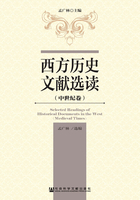
Peace and Truce of God
Account 1
Following the example of my predecessors, I, Gunbald, archbishop of Bordeaux, called together the bishops of my diocese in a synod at Charroux, and we, assembled there in the name of God, made the following decrees:1.Anathema against those who break into churches. If anyone breaks into or robs a church, he shall be anathema unless he makes satisfaction.
2. Anathema against those who rob the poor. If anyone robs a peasant or any other poor person of a sheep, ox, ass, cow, goat, or pig, he shall be anathema unless he makes satisfaction.
3. Anathema against those who injure clergymen. If anyone attacks, seizes, or beats a priest, deacon, or any other clergyman, who is not bearing arms (shield, sword, coat of mail, or helmet), but is going along peacefully or staying in the house, the sacrilegious person shall be excommuncated and cut off from the church, unless he makes satisfaction, or unless the bishop discovers that the clergyman brought it upon himself by his own fault.
Account 2
Drogo, bishop of Terouanne, and count Baldwin [of Hainault] have established this peace with the cooperation of the clergy and people of the land.
Dearest brothers in the Lord, these are the conditions which you must observe during the time of the peace which is commonly called the truce of God, and which begins with sunset on Wednesday and lasts until sunrise on Monday.
1. During those four days and five nights no man or woman shall assault, wound, or slay another, or attack, seize, or destroy a castle, burg, or villa, by craft or by violence.
2. If anyone violates this peace and disobeys these commands of ours, he shall be exiled for thirty years as a penance, and before he leaves the bishopric he shall make compensation for the injury which he committed. Otherwise he shall be excommunicated by the Lord God and excluded from all Christian fellowship.
3. All who associate with him in any way, who give him advice or aid, or hold converse with him, unless it be to advise him to do penance and to leave the bishopric, shall be under excommunication until they have made satisfaction.
4. If any violator of the peace shall fall sick and die before he completes his penance, no Christian shall visit him or move his body from the place where it lay, or receive any of his possessions.
5. In addition, brethren, you should observe the peace in regard to lands and animals and all things that can be possessed. If anyone takes from another an animal, a coin, or a garment, during the days of the truce, he shall be excommunicated unless he makes satisfaction. If he desires to make satisfaction for his crime he shall first restore the thing which he stole or its value in money,and shall do penance for seven years within the bishopric. If he should die before he makes satisfaction and completes his penance, his body shall not be buried or removed from the place where it lay, unless his family shall make satisfaction for him to the person whom he injured.
6. During the days of the peace, no one shall make a hostile expedition on horseback, except when summoned by the count; and all who go with the count shall take for their support only as much as is necessary for themselves and their horses.
7. All merchants and other men who pass through your territory from other lands shall have peace from you.
8. You shall also keep this peace every day of the week from the beginning of Advent to the octave of Epiphany and from the beginning of Lent to the octave of Easter, and from the feast of Rogations [the Monday before Ascension Day] to the octave of Pentecost.
9. We command all priests on feast days and Sundays to pray for all who keep the peace, and to curse all who violate it or support its violators.
10. If anyone has been accused of violating the peace and denies the charge, he shall take the communion and undergo the ordeal of hot iron. If he is found guilty, he shall do penance within the bishopric for seven years.
一 文献出处
Brian Tierney, ed.,Sources of Medieval History,Vol.1,New York, 1970, pp.114-116.
二 文献导读
10世纪末,在以法国为主的西欧大陆,教会发起了“上帝之和平与休战”运动,旨在限制封建骑士的暴力行为,得到一些世俗贵族的支持。
这一运动的产生并非是偶然的。9~10世纪的西欧不仅经济文化落后,而且政治分裂,战争频仍,社会秩序混乱。由于王权孱弱,各地封建主纷纷修筑城堡,相互争斗,并且为争夺领地和附庸而爆发私战。当时,封建骑士对社会危害最为严重。他们目不识丁,尚武斗狠,以战争为职业。骑士间的冲突不是依靠国王的司法来仲裁的,而是通过相互间的决斗来定夺的。他们掠夺成性,教堂、教士、商人、农民等常常成为骑士争战和抢劫的牺牲品。
在中世纪的西欧,基督教虽然与世俗政权有着权益之争,但它素来就是公共政治秩序的维护者,也是封建王权的支持者。为了获享既得的封建权益,拓展神权,控制各阶层人的思想取向和行为方式,基督教反对分裂割据和封建混战。面对整个社会动荡纷争的混乱局面,在世俗中央政权无法维持社会和平和正常秩序的情况下,基督教担负起了制止争战、维持和平的历史使命。基督教会发起“上帝之和平与休战”运动也具有特定的动机。在经济上,教会希望借此保护教会财产和教士的人身安全,也保护向教会缴纳地租和什一税的农民、商人的人身和财产安全。994年和1025年,马孔地区的主教举行和平集会,其主要目的就是反对奥托·归拉姆伯爵对教会领地的权利要求,特别是对属于克吕尼修道院等的较大修道院的土地的侵夺。而在政治上,随着封建化的加深,高级教士常常成为国王和大贵族的封建附庸而被其控制,教会欲通过此举来摆脱世俗政权对教会事务的干预与控制,树立教会维护秩序、和平与公正的“普世主义”的崇高形象。
当时,逐渐展开的“克吕尼改革”不断地克服教会封建化和世俗化的倾向,为教会发起“上帝之和平与休战”运动提供了有利条件。而世俗君主和封建大贵族的支持,也使得这个运动得以顺利拓展。“上帝之和平与休战”运动发端于法国南部和中部地区,然后逐渐向法国的西部、东部和北部地区延伸。从987年到994年,在法国南部勒皮主教区、阿奎丹夏洛主教区、纳尔旁主教区、里摩日和安瑟的主教区,主教、修道院院长等都举行了和平集会。一般认为989年的夏洛宗教会议是这一运动的发端。
本书所选的文献记载之一,就是夏洛宗教会议做出的“上帝之和平与休战”(Peace and Truce of God from the synod at Charroux)的规定。在规定中,大主教贡巴德以上帝的名义宣布了三条和平法令:谴责袭击教堂、抢劫教会财产的人;谴责抢劫农民或其他穷人的人;谴责那些伤害教士的人。同时他还以革除教籍的惩罚相警告。文献记载之二则是1063年法国北部泰劳勒主教区对世俗贵族所颁的有关“上帝之休战”(Truce of God —Bishopric of Terouanne)的规定。德洛哥主教与著名的佛兰德尔和海劳特伯爵巴尔德温(即著名的“征服者威廉”的岳父)约定,在各自的管辖区域内在特定的时间禁止战争,维持和平,并对违反者实施严厉的惩罚,包括开除教籍和实施“神裁判法”。
“上帝之和平与休战”运动在一定程度上限制了中古早期西欧封建贵族的私战和骑士的暴力活动,在教会和修道院周围地区建立了社会需要的最低限度的和平与安全,使西欧的社会秩序有所好转,从而为西欧的经济复兴创造了有利条件。同时,该运动增强了主教权力,从而也提高了教会的权威,为11世纪后期的教会改革与神权拓展提供了重要条件。
三 延伸阅读
Duby,G.,France in the Middle Ages,Massachusetts,1991.
Gies,F.,The Knight in History,New York,1984.
Head, T. F., and A. Landes,The Peace of God:Social Violence and Religious Response in France Around the Year 1000,Ithaca,1992.